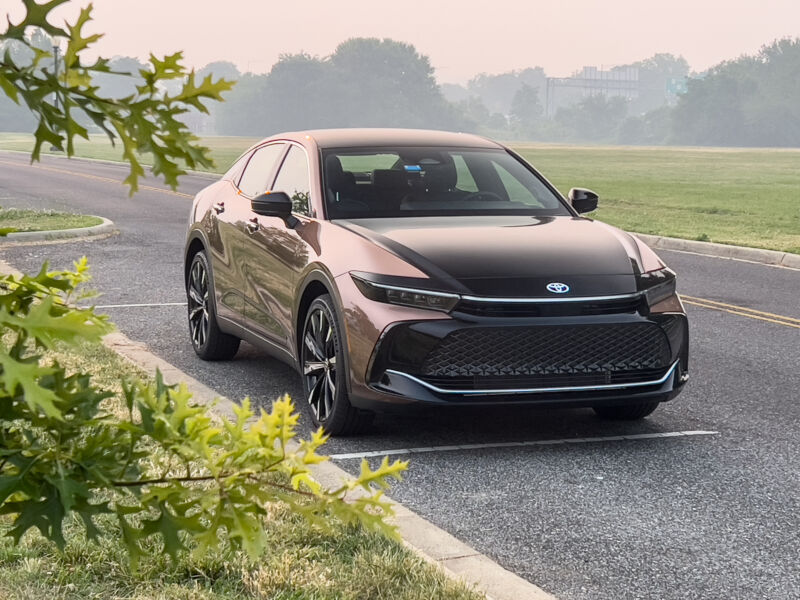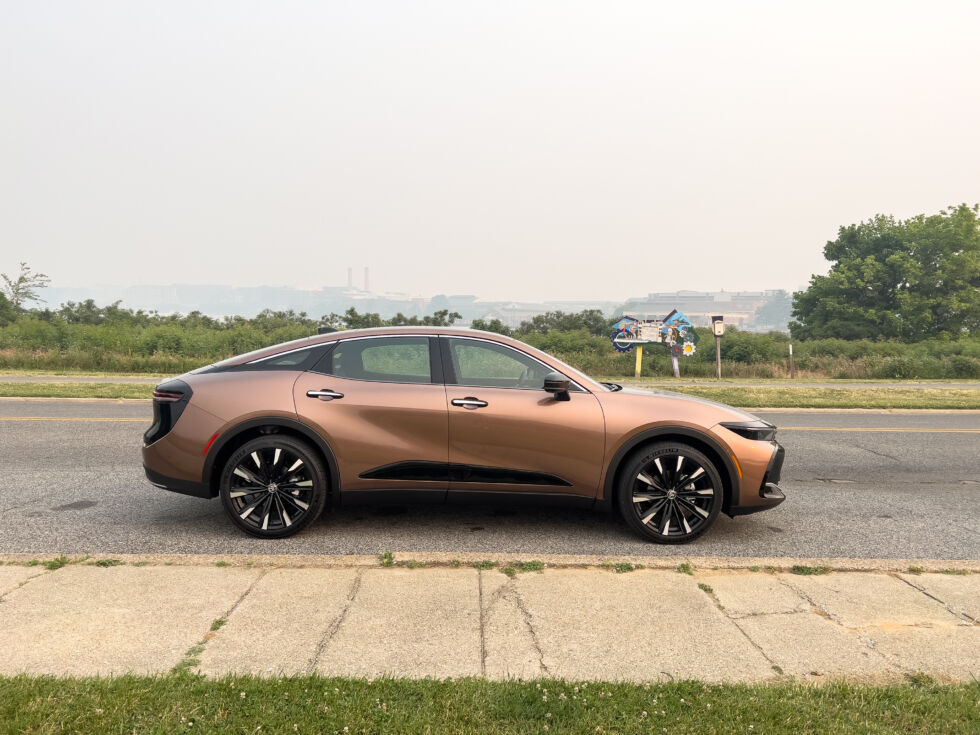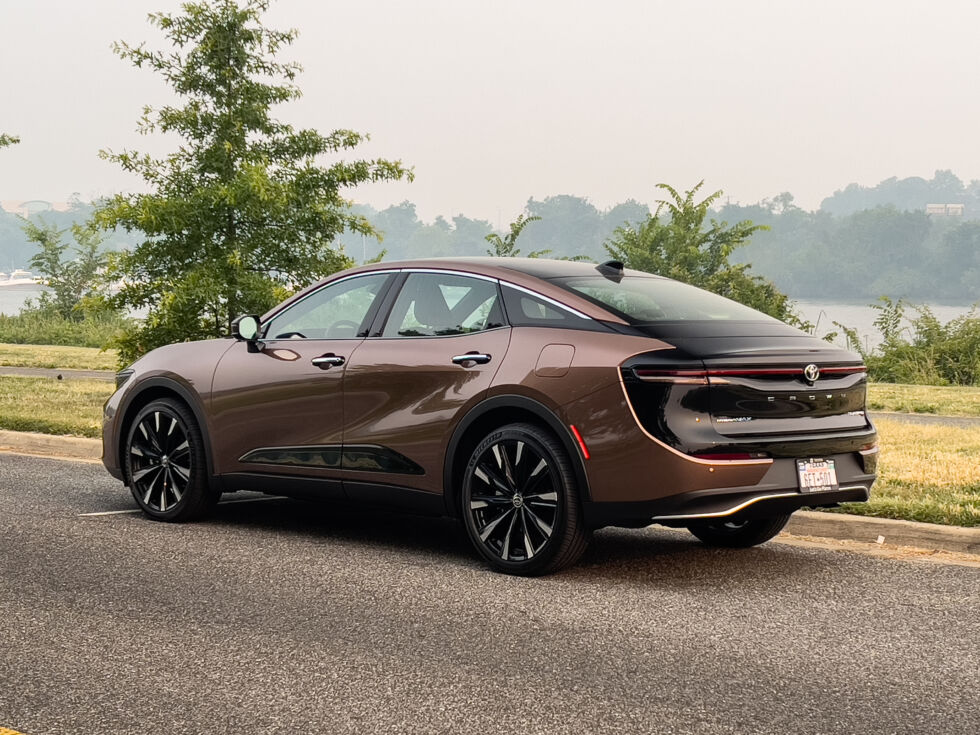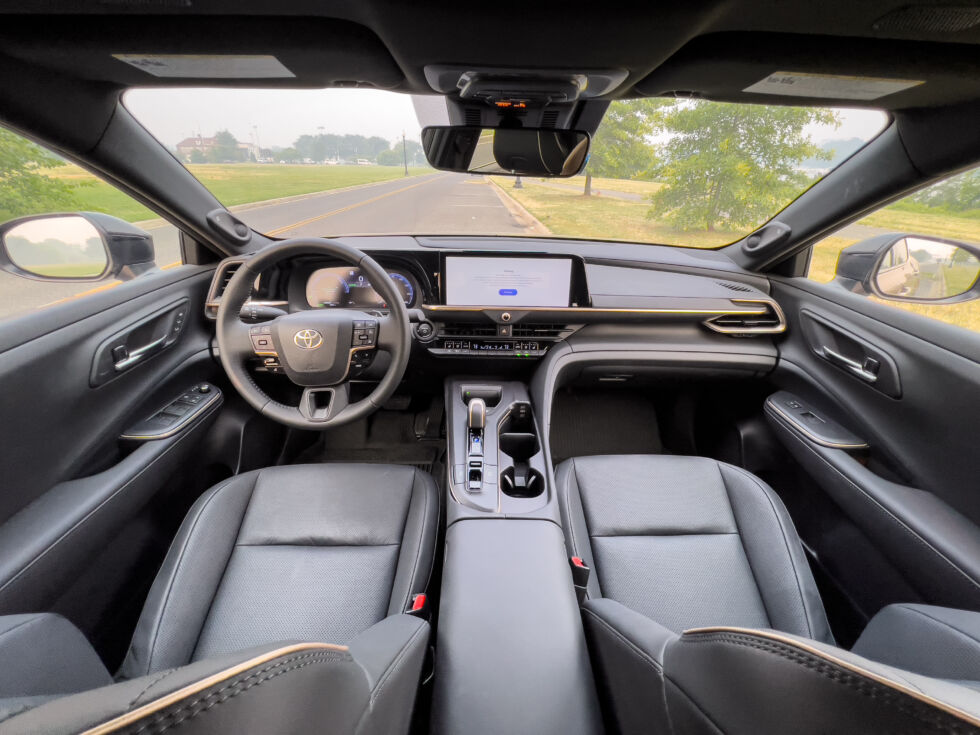
The sedan might not be properly extinct like non-avian dinosaurs, but it has certainly fallen out of favor with the car-buying public. That’s a topic that Toyota knows plenty about—even as the SUV becomes ascendant, its Camry sedan remains the nation’s best-selling vehicle that isn’t a pickup, crossover, or SUV. So its designers were evidently reading the tea leaves when it came time to replace the Avalon. That replacement is called the Crown, and while it definitely checks the “four doors and a trunk” criteria, its bold styling makes it the most SUV-like sedan I’ve encountered in some time.
The Crown shares its TNGA-K platform with other large Toyotas and Lexuses, including the aforementioned Camry, plus SUVs like the Venza, Highlander, and RX, and even a minivan. Those are all largely conventional, ignoring for the moment Lexus’ large cheese grater grille.
The Crown is less conventional, starting with a height that’s almost four inches taller than the Camry—60.6 inches (1,539 mm) despite near-identical ground clearance. It’s the same width as a Camry (72.4 inches or 1,840 mm depending on which flavor you speak) but four inches longer at 196.1 inches (4,980 mm), and with an inch-longer wheelbase (112.2 inches/2,850 mm). And it conforms—sort of—to the three-box shape one expects of a sedan.

For such a strongly styled vehicle, Toyota’s press materials are remarkably restrained, describing how its “vibe throws off the conventions of the typical sedan with a side profile that flows to a broad rear end. The dynamic body style is amplified by rounded and sweeping character lines which give it a launch ready, head-turning look.”
I still can’t quite decide whether I like it or not—the shape makes me think of the Jaguar I-Pace for some reason, although that car has many more straight edges than the curvaceous Crown. From other angles, it looks a bit like a bronze car has eaten a glossy black Prius.
All Toyota Crowns are hybrids, but you’ll get a different powertrain depending on which trim you choose. The $39,950 Crown XLE and $45,550 Crown Limited both combine a 184 hp (137 kW), 163 lb-ft (220 Nm) 2.5 L four-cylinder gasoline engine with a pair of electric motors and a continuously variable transmission. This has a maximum power output of 236 hp (176 kW), with the front hybrid motor rated for 118 hp (88 kW) and 149 lb-ft (202 Nm) and the rear motor at 54 hp (40 kW) and 89 lb-ft (120 Nm).

Our test car was the $52,350 Crown Platinum, which offers an entirely different yet still all-wheel drive hybrid powertrain (called Hybrid Max). In this case, the gasoline engine is a 2.4 L turbocharged four-cylinder, generating 264 hp (197 kW) and 332 lb-ft (450 Nm). This engine uses a six-speed automatic transmission instead of the CVT. The Hybrid Max powertrain’s two electric motors are also more powerful at 82 hp (61 kW) and 215 lb-ft (450 Nm) at the front and 79 hp (59 kW) and 124 lb-ft (168 Nm) at the rear axle.
Combined output is 340 hp (254 kW) and 400 lb-ft (542 Nm), and the front-to-rear power split ranges from 70:30 to 20:80 depending on the road conditions and situation.
The less-powerful hybrid powertrain is the one to choose if you’re looking for good fuel efficiency, as it’s rated at a combined 41 mpg (5.7 L/100 km). The Hybrid Max powertrain boasts significantly more power and torque but an identical NiMH traction battery, so it’s not surprising it’s not as efficient. The hit to consumption is less than the boost in output—the EPA rates it at a combined 30 mpg (7.8 L/100 km), although we fell a couple of mpg short of that.

The Platinum comes equipped with big 21-inch wheels and offsets any ride penalty of the thinner tires with its standard adaptive suspension. The suspension tuning is definitely biased more toward comfort than performance—no bad thing, to be honest. There are an array of drive modes to pick from, including eco, comfort, normal, sport S, sport S+, and a custom setting. I spent most of our test week with the Crown in normal or comfort—the sportier settings add weight to the steering and change the damping, but the sedan rolls too much when cornering to be thought of as a canyon carver or a machine that begs you to take the long route home.
It’s not an unpleasant car to drive around in, though. The crossover-height driving position translates to great visibility ahead of you, and unlike the Prius or bZ4x, you don’t need to drive with the steering wheel in your lap to see the main instrument display. It would be a slightly better user experience if you didn’t have to always remember to turn on the brake hold feature every time the car is started, a common Toyota trait. In 2023 it’s OK if a car remembers some settings while it’s asleep.
The Crown Platinum (as well as the Limited) gets Toyota’s 12.3-inch infotainment system. The UI is restrained and responsive but a little limited in what it will show you. The fact that it’s an entirely touch-based interaction lets it down, but Apple CarPlay and Android Auto are both built-in and wireless and look good, filling the large screen. (Do note that wireless casting connections can still be a little buggy, and rebooting the phone usually solves any problem.)
-
The rear seat has a couple of USB-C ports, and there are cupholders in the flip-down armrest.Jonathan Gitlin
-
See? Sedan.Jonathan Gitlin
-
The trunk opening is large.Jonathan Gitlin
The rear bench is better seating two rather than three—the way the seat is inset a bit from the door is probably what set the pattern processing part of my brain thinking about I-Paces. But an occasion to help out a friend (as a photo prop) for a story about a DC ride-sharing program that predates all the startups let me get some chauffeured seat time in the back, and it’s comfortable and feels bright and spacious with all that glass. The trunk is also rather spacious at 15.2 cubic feet (430 L).
I’m drawn to the Crown’s quirky styling, and it’s pleasant if uninvolving to drive. I’m not quite sold on the Hybrid Max powertrain, however. It’s not particularly efficient, and since the Crown doesn’t feel like either a GT or a sports car, I’m not sure it needs the extra power. But I’m glad Toyota is trying new things.
https://arstechnica.com/?p=1957911

